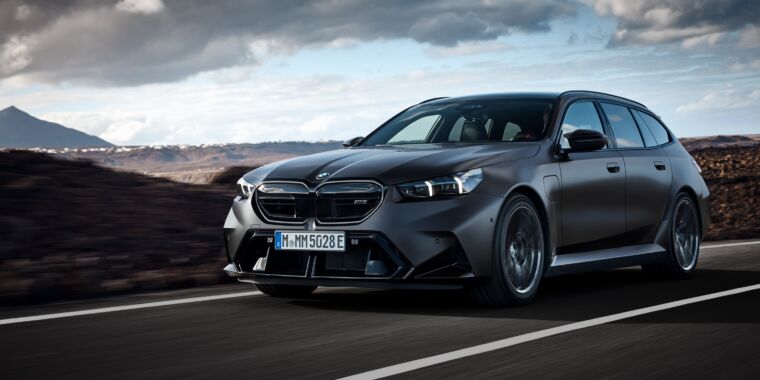Fabian Kirchbauer Photography/BMW
Telling someone they can’t have something is a great way to make them want it. Take the station wagon, for example. This once-popular form factor for family transport has all but disappeared from new car showrooms in North America, consequently making the station wagon all kinds of cool in the process. At the apex are the superwagons, factory-tuned models with prodigious power outputs, with one in particular attaining legendary status in large part because BMW chose never to import the M5 Touring across the Atlantic. Until now.
BMW first made a Touring—or station wagon—version of the M5 in 1992 with the second-generation (better known as the E34) 5 series. When I was growing up in the UK, these were unavailable, as they were in the US, quickly giving the five-door M5 an extra level of cachet that the four-door lacked, despite a starring role in Ronin.
Truth be told, the E34 M5 Touring looked very cool, but it wasn’t the greatest sales success.
The same could be said for the next M5 Touring, which turned up in 2007 with the E61 generation 5 Series and a V10 under the hood. Only about 5 percent of E61 M5s were the five-door wagon, and US customers were again denied the chance to buy one. For the American M5 Touring devotee, the answer seemed to be “wait for the 25-year rule to apply,” something that has meant E34 M5 Tourings have been eligible for import for a few years now.
The M5 Touring skipped a generation, but BMW decided to bring it back for the newest iteration of its midsize continent crusher. And while it looked for a while like the Touring would again be a Euro-only thing, BMW’s North American arm has decided that the market is now ready for its most practical of performance machines.
-
The two-box shape looks so well-proportioned when it’s a wagon.
Fabian Kirchbauer Photography/BMW -
The 2025 M5 launch will take place toward the end of this year.
Fabian Kirchbauer Photography/BMW -
Colors other than bright red are available.
Fabian Kirchbauer Photography/BMW -
The Touring is still hugely practical.
BMW -
E34 M5 Touring are eligible for import under the 25-year rule.
BMW -
The E61-generation Touring body was most handsome.
BMW
People say it’s too heavy
The G60-generation (or G61, for the Touring) M5 is a bit of a controversial car, however. It uses the same plug-in hybrid powertrain as the XM SUV, generating 717 hp (535 kW) and 738 lb-ft (1,000 Nm)—more than double the power and torque of the E34 M5.
While there are obvious advantages to a PHEV performance car in both performance (electric motors deliver their torque immediately) and efficiency (since it can run on just electric motors in low-speed situations), there is a bit of a drawback when it comes to weight. Adding a 14.8 kWh (useable) lithium-ion battery pack and the 194 hp (145 kW) electric motor have pushed the M5 Touring’s curb weight to 5,530 lbs (2,508 kg).
That’s 1,683 lbs (763 kg) heavier than the first M5 Touring, and all that mass has made enthusiasts mad (though almost every road test and first drive has come back aglow about the car’s capabilities). And I’m pretty sure that the 1992 M5 Touring didn’t have heated and cooled seats or an infotainment system capable of playing video or games. And it definitely didn’t have a torque-vectoring rear differential.
BMW debuted the US version of the M5 Touring on Thursday as part of Monterey Car Week and also announced the pricing. If you want a car that can carry loads of up to 57.6 cubic feet (1,632 L) and accelerate to 60 mph in 3.5 seconds, be prepared to pay BMW at least $122,675.
